Carl Zeiss Vario-Tessar T E 16-70mm f/4 ZA OSS Review

Introduction
The Carl Zeiss Vario-Tessar T E 16-70mm f/4 ZA OSS (SEL1670Z) is a premium standard zoom lens for Sony NEX compact system cameras. It offers the equivalent angle of view as a 24-105mm lens on a 35mm camera and features a near-circular 7 blade diaphragm which creates an attractive blur to the out of focus areas of the image. The optical formula comprises 16 lens elements in 12 groups. It has a minimum focusing distance of 35cm/1.15ft and a maximum magnification of 0.23x. Sony’s DMF technology allows for direct manual focusing after autofocus lock-on without having to switch modes, while the built-in Optical Stabilisation system offers up to 4 stops of compensation. The Carl Zeiss Vario-Tessar T E 16-70mm f/4 ZA OSS lens is currently available for £849 / $999 in the UK and the US, respectively.
Ease of Use
Weighing in at 308g, the alloy-bodied Carl Zeiss Vario-Tessar T E 16-70mm f/4 ZA OSS is quite a substantial E-Mount lens that rather dwarves the compact Sony NEX-7 body that we tested it with, as shown in the photos below.
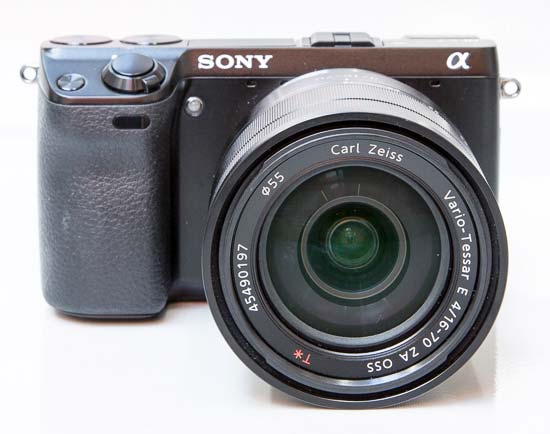 The Carl Zeiss Vario-Tessar T E 16-70mm f/4 ZA OSS lens
The Carl Zeiss Vario-Tessar T E 16-70mm f/4 ZA OSS lens
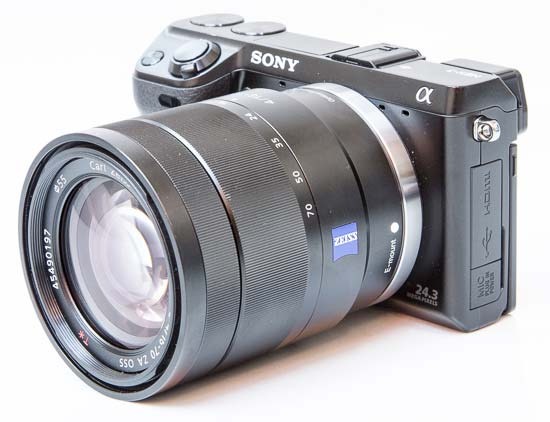 The Carl Zeiss Vario-Tessar T E 16-70mm f/4 ZA OSS lens mounted on a Sony NEX-7
The Carl Zeiss Vario-Tessar T E 16-70mm f/4 ZA OSS lens mounted on a Sony NEX-7
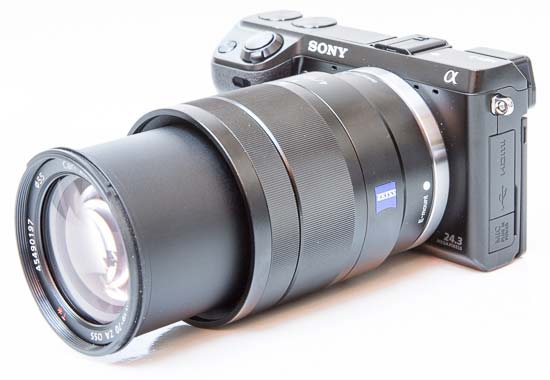 The Carl Zeiss Vario-Tessar T E 16-70mm f/4 ZA OSS lens mounted on a Sony NEX-7
The Carl Zeiss Vario-Tessar T E 16-70mm f/4 ZA OSS lens mounted on a Sony NEX-7
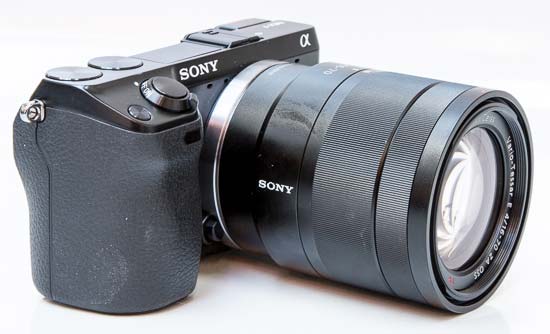 The Carl Zeiss Vario-Tessar T E 16-70mm f/4 ZA OSS lens mounted on a Sony NEX-7
The Carl Zeiss Vario-Tessar T E 16-70mm f/4 ZA OSS lens mounted on a Sony NEX-7
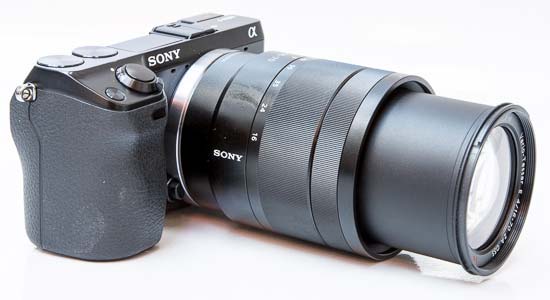 The Carl Zeiss Vario-Tessar T E 16-70mm f/4 ZA OSS lens mounted on a Sony NEX-7
The Carl Zeiss Vario-Tessar T E 16-70mm f/4 ZA OSS lens mounted on a Sony NEX-7
Build quality is excellent, with both a metal lens barrel and a metal lens mount, but you'd expect that given the high price of the lens. The wide, ridged zoom ring takes about a quarter of a turn to zoom through the range, with the lens gradually extending out until it reaches 70mm.
The manual focus ring is a little on the slim side, and utilises the NEX series's fly-by-wire operation, which means that there are no hard stops at either end of the zoom range.
There's also no depth-of-field scale, distance scale or infrared index, a shame given the cost of the lens.
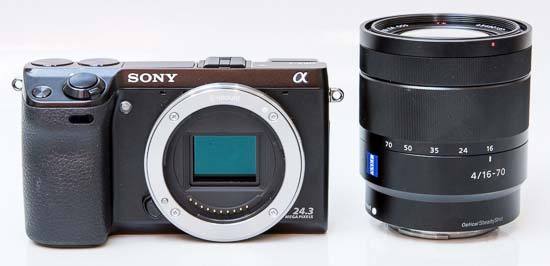 The Carl Zeiss Vario-Tessar T E 16-70mm f/4 ZA OSS lens alongside the Sony NEX-7
The Carl Zeiss Vario-Tessar T E 16-70mm f/4 ZA OSS lens alongside the Sony NEX-7
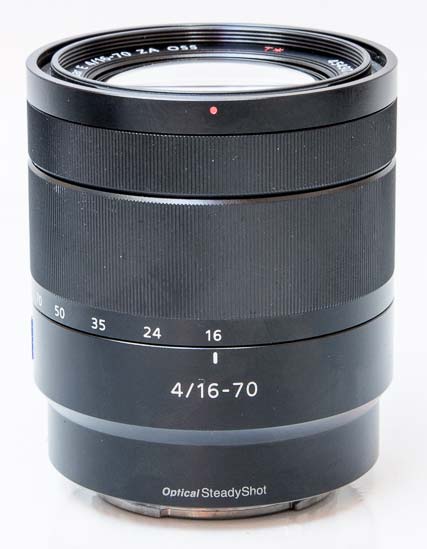 Side of the Carl Zeiss Vario-Tessar T E 16-70mm f/4 ZA OSS lens at 16mm
Side of the Carl Zeiss Vario-Tessar T E 16-70mm f/4 ZA OSS lens at 16mm
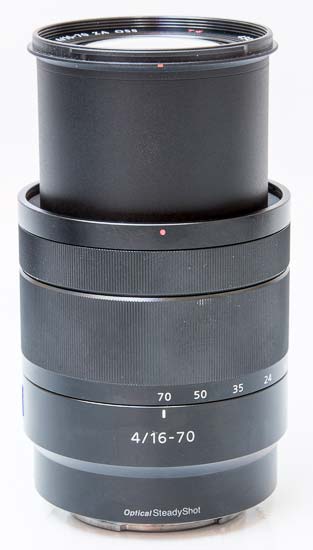 Side of the Carl Zeiss Vario-Tessar T E 16-70mm f/4 ZA OSS lens at 70mm
Side of the Carl Zeiss Vario-Tessar T E 16-70mm f/4 ZA OSS lens at 70mm
Focusing is usefully internal and manual focusing is possible when set on the specific camera body. The lens also boasts Optical SteadyShot image stabilization, which offers up to four shutter spee steps of compensation - again this is enabled through the camera's menu system, rather than a physical switch on the lens.
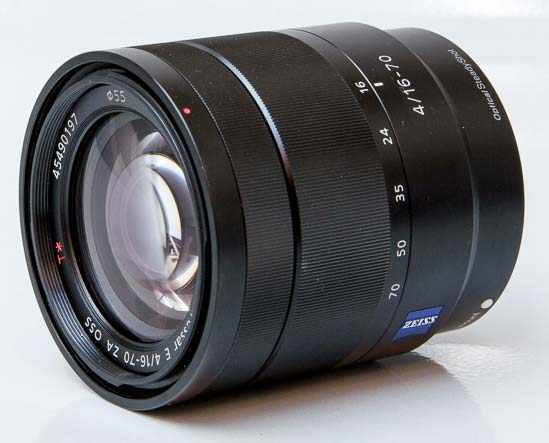 Front of the Carl Zeiss Vario-Tessar T E 16-70mm f/4 ZA OSS lens
Front of the Carl Zeiss Vario-Tessar T E 16-70mm f/4 ZA OSS lens
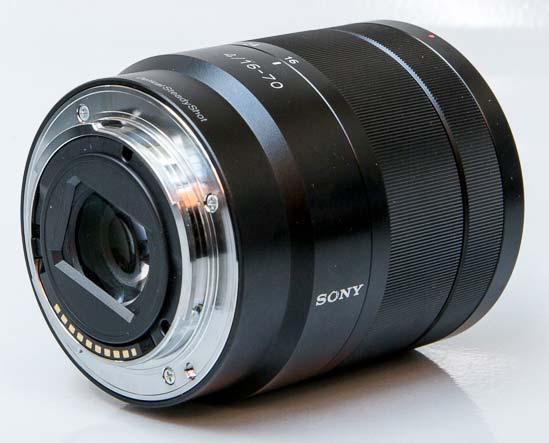 Rear of the Carl Zeiss Vario-Tessar T E 16-70mm f/4 ZA OSS lens
Rear of the Carl Zeiss Vario-Tessar T E 16-70mm f/4 ZA OSS lens
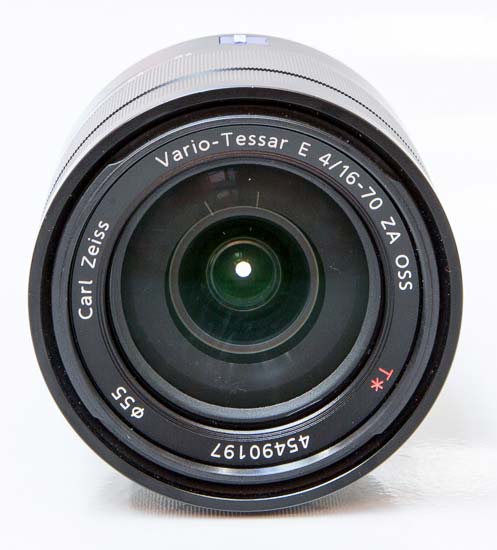 Front of the Carl Zeiss Vario-Tessar T E 16-70mm f/4 ZA OSS lens
Front of the Carl Zeiss Vario-Tessar T E 16-70mm f/4 ZA OSS lens
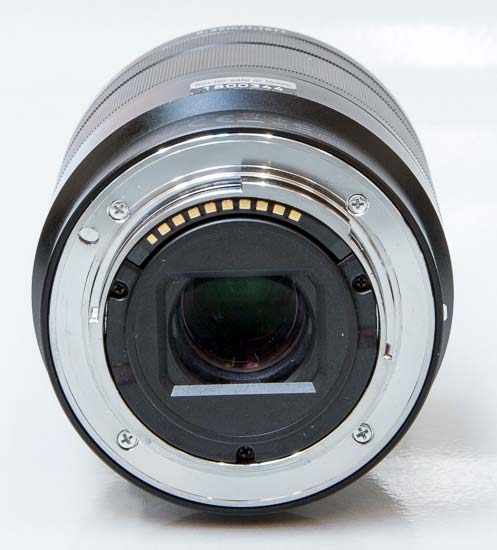 Rear of the Carl Zeiss Vario-Tessar T E 16-70mm f/4 ZA OSS lens
Rear of the Carl Zeiss Vario-Tessar T E 16-70mm f/4 ZA OSS lens
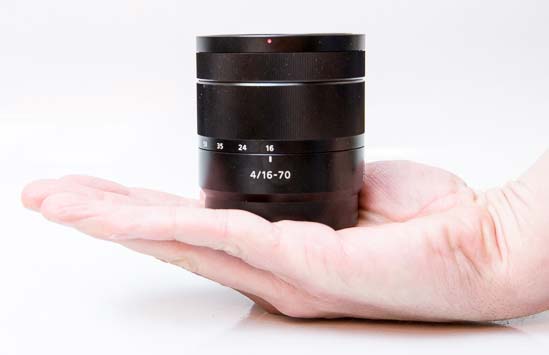 The Carl Zeiss Vario-Tessar T E 16-70mm f/4 ZA OSS lens in-hand
The Carl Zeiss Vario-Tessar T E 16-70mm f/4 ZA OSS lens in-hand
The Carl Zeiss Vario-Tessar T E 16-70mm f/4 ZA OSS ships with a good quality case and a durable lens hood (ALC-SH127) which attaches inside the lens barrel rather than outside. It accepts 55mm filters via plastic threads.
Focal Range
At the 16mm focal length the angle of view is 83 degrees.
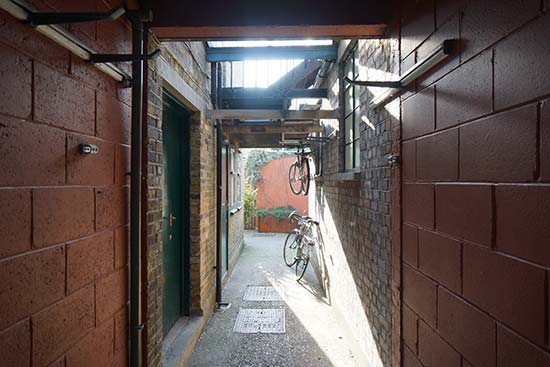 Field of view at 16mm
Field of view at 16mm
At the 70mm focal length the angle of view is 23 degrees.
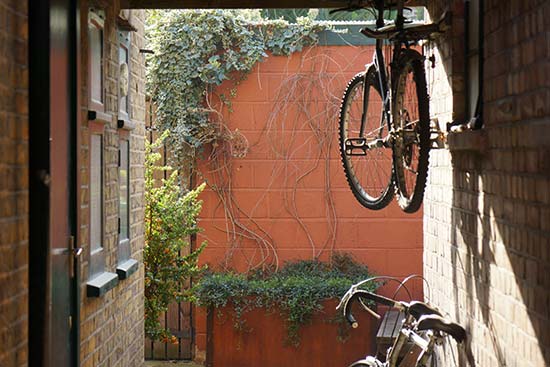 Field of view at 70mm
Field of view at 70mm
Focusing
The Carl Zeiss Vario-Tessar T E 16-70mm f/4 ZA OSS lens has quite a narrow focusing ring. There are no hard stops at both ends of the range, making it a little more difficult to set focus at infinity. Polariser users should be pleased that the 55mm filter thread doesn't rotate on focus.
When it comes to auto-focusing, the Carl Zeiss Vario-Tessar T E 16-70mm f/4 ZA OSS zoom is a quick performer, taking about 0.2 seconds to lock onto the subject when mounted on the Sony NEX-7 that we tested it with, although it is noticeably a little slower to autofocus at the 70mm end.
We didn't experience much "hunting", either in good or bad light, with the lens accurately focusing almost all of the time, and it's also a quiet performer thanks to its in-lens motor, ideal for HD movie shooting.
Chromatic Aberrations
Chromatic aberrations, typically seen as purple or blue fringes along contrasty edges, are only notable by their almost complete absence from our test shots.
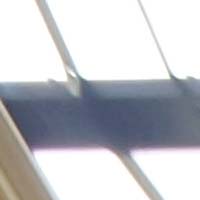 |
 |
Light Fall-off
With the lens set to its maximum aperture, there is some light fall-off in the extreme corners at both ends of the zoom range, but it won't affect your real-world shots.
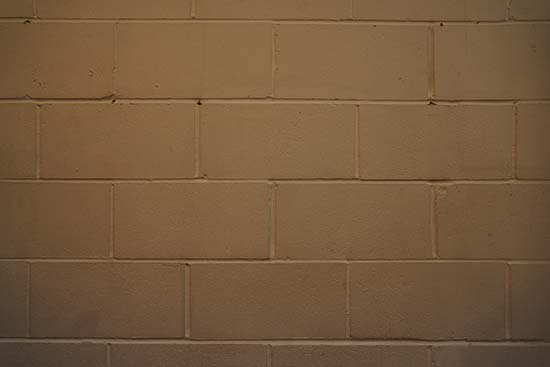 Light fall-off at 16mm
Light fall-off at 16mm
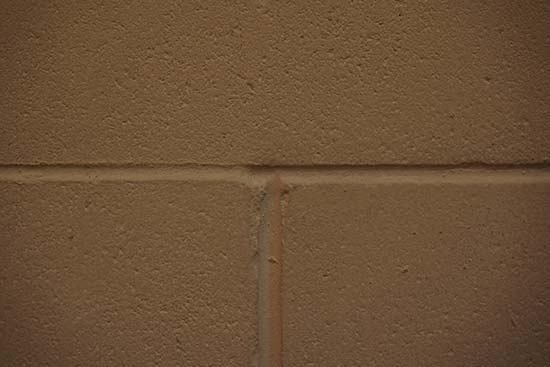 Light fall-off at 70mm
Light fall-off at 70mm
Macro
The Carl Zeiss Vario-Tessar T E 16-70mm f/4 ZA OSS isn't claimed to be a macro lens, but it delivers a pretty good performance nonetheless. It has a minimum focusing distance of 35cm/1.15ft and a maximum magnification of 0.23x. The following example demonstrates how close you can get to your subject, in this case a Compact Flash memory card.
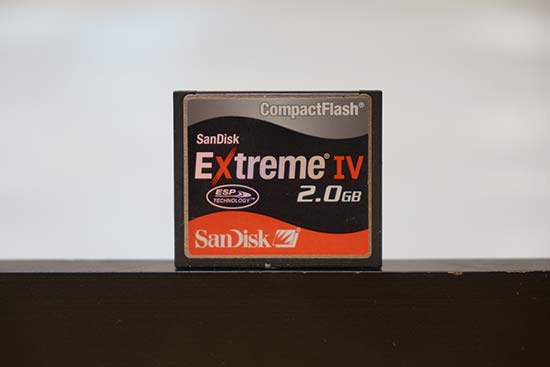 Close-up performance
Close-up performance
Bokeh
Bokeh is a word used for the out-of-focus areas of a photograph, and is usually described in qualitative terms, such as smooth / creamy / harsh etc. In the Carl Zeiss Vario-Tessar T E 16-70mm f/4 ZA OSS lens, Carl Zeiss employed an iris diaphragm with seven rounded blades, which has resulted in appealing bokeh in our view. We do realise, however, that bokeh evaluation is subjective, so we've included several 100% crops for your perusal.
 |
 |
 |
 |
Sharpness
In order to show you how sharp this lens is, we are providing 100% crops on the following pages.
